- Home
- Tim Lebbon
Relics--The Folded Land Page 2
Relics--The Folded Land Read online
Page 2
A sharp, loud crack split the world. A bright flash, bright as the sun, blinded her. Something struck her so hard that she felt shifted aside.
All became darkness.
* * *
“I feel fine, Dad. Really. A bit fuzzy in the head, like I’m drunk.”
“And what would you know about being drunk, young lady?”
Sammi grinned and looked aside. She knew when she could play her dad and when she couldn’t, and this was one of those times she could. “You might have died,” he’d said when they were in the ambulance, and the terror in his eyes had made her cry. The terror, and the deep loss that resided there, despite the fact that she was still breathing.
“Last Christmas,” Sammi said. “Remember when Chris and Lennie came over for the evening? I was in my room with Jenn.”
Her dad frowned, half-smiling. No, he couldn’t remember, she realized, and she felt a pang of guilt, because sometimes he told her he could hardly recall any good times with her mother at all. It was something to do with the way he was processing the grief. Every memory was in there, he said, but the shock of her death had put a buffer around them. Like bubble-wrap.
Making him try to remember felt cruel.
“I snuck downstairs,” Sammi said. “Mom was laughing, Lennie was all embarrassed, ’cos you and Chris were talking over each other about some holiday you’d been on when the hotel staff caught you all skinny-dipping in the pool past midnight.”
“Shhh!” he said, looking around the emergency room as if afraid someone would hear. She saw how pleased he actually was, because now he was remembering that evening, and that was a good thing.
“Yeah, Sally was laughing,” he said, nodding slowly.
“Well… I poured Jenn and me a glass of punch in the kitchen and crept back upstairs with them.”
“You little sneak! You stole two glasses of punch?”
“No, Dad,” Sammi said. She paused for effect. “I stole six.” She started laughing, then trailed off when it hurt her head.
“So is this the famous young lady who got struck by lightning?” A doctor entered the treatment cubicle. He might have been the tallest man she’d ever seen, with dreadlocks down to the small of his back and hands the size of footballs. His voice, high and soft, didn’t match his appearance, and though he looked stressed, his eyes smiled.
“That’s me!” she said. “Do I have superpowers now?”
The doctor picked up her charts, flipped through a few pages, and raised his eyebrows.
“Well, it says here you can travel through time and move things with your mind.”
She shrugged, trying for nonchalant.
“Mind if I look you over?” he asked. “It’s not every day I treat a time traveler.”
“How do you know?” Sammi asked.
“Touché.” The doctor shone a little flashlight into her eyes, took her pulse and blood pressure, listened to her heart. Her dad watched quietly, letting the man do his job, but Sammi could see he was itching to ask a million questions.
“Yep, you’re fine,” the doctor said at last. “Very slight burns on your right shoulder, no worse than a sunburn. A few singed hairs on your neck.”
“I do not have a hairy neck!”
“Not anymore you don’t.”
“And my new tats, of course.”
“Yeah, they’re quite something.” Sammi turned her arm slowly as the three of them stared at the patterns on her left shoulder and down her arm, around her bicep and tricep and finishing just below her elbow. They were a light brown and golden color. Her dad had said they looked like a satellite photo of a river delta. She thought they resembled the delicate fronds of a big leaf with sunlight shining through it.
“They look like sheet lightning in the clouds,” the doctor said, and the similarity struck Sammi so hard that she wondered why she hadn’t seen it before.
Of course they do! she thought. It’s the bolt that hit me, echoing on my skin.
“Will they stay?” she asked. It was sort of cool, but she was also worried that the freak accident might have scarred her for life.
“They’ll fade over time,” he said. “Few days, maybe a week or two. You should probably take pictures.”
“Way ahead of you,” Sammi said.
“They’re burst capillaries,” the doctor continued. “At least, that’s what all the research says. Microscopic damage to lots of really tiny veins.”
“That sounds bad,” her dad said.
“No worse than bruising,” the doctor said. “Just in much nicer patterns.”
“So she’s really okay?”
“Right as rain.”
“But she was struck by lightning!”
The doctor’s face broke into a smile at last. “And that’s very cool. She’s got a great story to tell her friends.”
“But…” Her dad shook his head. “The electricity. Her heart.”
“This isn’t something I’ve ever seen before,” the doctor admitted, sitting on the edge of the bed. “So I did a quick bit of research. Usually, people who get electric shocks from a wire or socket become injured or even die because it’s a sustained dose. A second, two seconds or more, long enough to damage cells and induce organ failure. With a lightning strike, it’s over in a millionth of a second. The charge usually travels across the surface of the body, not through, especially in this case when she was soaked to the skin. There’s a case of a guy in Florida being struck while playing volleyball, getting up afterward, finishing his game.”
Sammi concentrated on a pen in the doctor’s top pocket. She focused, trying to make it lift out and drop to the floor. It didn’t work. She was disappointed.
Silly sausage, a voice said. She blinked, startled. It had sounded just like her mother, whispering to her from the past.
“But Sammi passed out,” her father said.
“It’s like being punched,” the doctor said. “Hard. By a grizzly. That’s where the fuzzy head comes from. Trust me, the scans all came out clear. No bleeds, no internal scarring. Heart trace is fine.”
“So I’m free to go?”
“Free to go.” The doctor held out his big hand for a high-five. She didn’t leave him hanging.
“Thanks,” her dad said. “Thanks so much.” His voice broke a little, and so did Sammi’s heart. For a while he’d been afraid that he had lost her, too.
“Don’t mention it,” the doctor said. He turned and left the cubicle, heading to someone more needy.
“So,” Sammi said. “Now that I’m a superhero, can we get take-out on the way home?”
“It’s eleven in the morning.”
“Don’t care. I’m starving. Besides, I can time travel, so I’ll make it dinner time.”
He grinned. “Chinese?”
“Chinese.”
They left the hospital together, and he held her hand. He hadn’t done that for some time. She was too old, really. She squeezed back.
* * *
Pulling up outside the house, Sammi felt strange. Last time she’d been here she hadn’t come home properly—the lightning bolt had seen to that. She scanned the graveled parking area and lawn, looking for scorch marks. There was nothing. He must have picked up the spilled coffee, too, and she mourned the lost donuts.
“You okay, honey?” her dad asked.
“Yeah, Dad, I’m good. Kind of tired.”
“Still hungry?”
She nodded. It felt strange. Like coming home to a place so safe and familiar, and returning somewhere after a long time away. The familiarity held a deep nostalgia that someone her age should hardly recognize. “You’ve got an old head on your shoulders,” her mom used to say, and Sammi sometimes imagined herself with gray hair and strange, knowing eyes.
“I’m just going out on the dock for a little bit,” she said. “It’s a nice day, and some sun will make me feel better.”
“You’re sure?” That look of uncertainty. He asked her questions like that a lot nowadays. You’re sure? Do
you really think so? Are you certain you want to do that? It had something to do with grief and the uncertainties he felt about her mother dying. In some ways he was being overprotective, making sure that every action Sammi took was a safe one. It was as if he couldn’t bear to have her to grieve on her own. They often spent time together, walking or sitting on the sofa and talking about Mom, looking through photos or old videos, crying and laughing and struggling to move on in their own individual ways.
But sometimes it became cloying.
Sometimes, Sammi just wanted to be on her own.
“I’m sure,” she said, smiling. “It’s one of those moments.” They both had moments that they talked about. Unremarkable memories of her mother, his wife, sitting somewhere and telling a joke, planting a rose bush, pointing at a flock of birds sheeting back and forth across the estuary. They might be years old, random recollections of lost times that meant so much. Every one of them was special.
“Right,” he said, smiling, nodding. “They’re important. Every moment is important.” He paused, and then added, “I’ll put the food in the oven to keep it warm.”
“I won’t be that long, Dad,” she said. “Ten minutes.”
“Okay. Still want to go kayaking this afternoon?”
“Absolutely! I’ll race you.”
“You’ll lose.” He always said that, and until lately he’d been right. Last summer, though, Sammi started beating him in their races. She remembered her mother laughing as they’d both splashed and sweated their way past the spot where she sat in a boat, Sammi edging ahead by half a length and lifting her paddle skyward in triumph. She’d been so pleased that she hadn’t stopped mentioning it for the rest of the day. That long-ago, hot and perfect day.
While her father carried their early take-out to the house, Sammi crossed the lawn toward the dock. Though the sky was a searing blue and the midday sun beat down, the lawn was still damp from the previous day’s surprise downpour. Water soaked through her shoes and into her socks. It was a nice feeling, cool and calming. She stepped onto the dock and kicked off her shoes, pulled off the socks, and enjoyed the feeling of warm wood on the soles of her feet.
She walked to the end of the dock and felt as if she should continue onward. As if there was somewhere else to go. As if there was more to see. This was her favorite place in the whole wide world, but something inside seemed to be urging her elsewhere. Across the wide inlet she could see a dozen houses sitting close to the water, boats docked beside some, flags flying from poles, a few people just visible in gardens, heat haze making ghosts out of them. Several boats chugged up and down the river. A group of kayakers paddled past. She felt an unaccountable need to keep walking, because this wasn’t where she needed to be.
Sammi’s heart hammered in her chest, and as she turned to go back to the house a splinter slid into her skin just beneath her big toe.
Ow!
Silly sausage! a voice said just over her shoulder, and she spun around. Her mother’s pet name for her, spoken in a voice so like her mother’s and yet with a weird lilt, like the distorted echo of someone impersonating her almost perfectly.
“Mom?” Sammi asked.
A shadow passed across the sun and she looked up. Clouds were forming, wispy, darkening. Her skin prickled all across her body. The hairs on her arm stood on end. She looked back toward the house. Her father stood outside the open patio door, smiling and waving her over so that they could share lunch. He and the house were a million miles away.
A sharp, loud crack split the world.
3
Sammi knew that she wasn’t dreaming, but every step felt light, every moment loaded with remarkable potential. Each time she blinked she expected the world to have changed, and in a way it did. One moment to the next presented a whole new existence, although each world contained constants—her father’s love, her own grief, her mother’s unending, unbearable absence.
Everyone sees the world in a different way, a voice whispered in her ear, and it was something her mother used to say, uttered in her voice. So when you look at it like that, we each live in our own world. She felt no threat from the strange presence. In fact, it was comforting. Sammi glanced around, blinking rapidly as if to renew, renew. The shimmer remained in the air, a heat haze that enclosed her all around and guided her onward.
She was tugged in two directions. From behind, the love and need of her father. She knew how worried he would be, how confused, and instinct sought to turn her around and take her right back to the riverside house. From ahead, something else drew her on. She couldn’t be quite sure what it was yet, but the presence accompanying her promised that it was wonderful.
Sammi had always been a curious girl.
We’ll ride the breeze and take a look. Her mother’s voice again. She’d used that saying whenever they embarked upon a family journey somewhere they’d never been before. She’d said it the first time they’d driven down to New York, and along the way Sammi had been wondering where they would park their car and mount the wind that would take them into the city. By the time the great skyscrapers had come into view, however, she’d forgotten about riding the breeze.
“I’ll be back soon,” she whispered to the warm summer day. It was lunchtime, and the roads were busy with workers going out for food, tourists choosing their restaurant for the day, and other vehicles going on a hundred errands she would never know. “Be back soon, Dad. Keep the food warm.”
Just another girl walking along the side of the road, she stepped onto the grass verge whenever a vehicle came past, and every time she locked eyes with the driver, wondering whether they could see the shape that accompanied her and what they might think of it.
Although she knew what her father must be going through, the shape told her that it would be all right.
He’ll be fine, it said, no longer in her mother’s voice. Its own voice was just as calm, though a little colder, and not imbued with the love her mother always had for her. He’ll barely know you’re gone, and you’ll be back before you know it. Something about the voice, its words, sounded fake.
Fakery didn’t matter in a dream.
“Is this real?” she asked.
As real as it needs to be.
She felt the soft warm breeze on her face, smelled exhaust fumes and the sea, heard the shouts of children playing in a school to her left and the busy mutterings of adults shopping at a line of stores across the road to her right. Dunkin’ Donuts was over there. The one she’d visited before she’d been struck by lightning.
Her left shoulder, back, chest, and arm tingled as if from sunburn, yet it was a strangely pleasant discomfort. She pulled up her sleeve and looked down, and the pale frond-like pattern from yesterday was darker, deeper, more textured and elaborate. She gasped at the exquisite detailing, pausing by the side of the road and turning her arm slowly left and right. It was as if she were flying above a jagged landscape, looking down upon ridges and valleys, woodlands and plains. In places her pale skin was darkened several shades, in others burnt to a vivid pink. She blinked and if anything the vision became deeper, more defined.
Between ridges on her skin she saw the glinting curve of a river.
A familiar freckle became a clearing in a darker woodland.
A swath of fine hair close to her elbow, darkened into nubs by intense heat, was a landscape of tumbled boulders.
A car horn blared, startling her back from the strange distance that had grown between her and the world. She stumbled onto the verge. Fingers dug into her right arm and helped her, and when she looked that way a shape manifested from the heat and sunlight. She felt its shadow cool on her bare arm before it became fully solid, and though she knew she should be afraid, she wasn’t.
Because none of this is real, she thought, and at last the idea settled that she was still lying out there on the dock. She’d been struck by lightning a second time, and her dad was leaning over her, phone in hand while he talked to paramedics. Making sure her airways were open,
tipping her onto her side and into the recovery position.
She thought about this for a moment, but then the shape was almost whole.
It’ll be Mom, she thought. I’m lying here, maybe even dying, and Mom has come to me to make sure I’m not afraid.
Yet the shape was not her mother. Taller, slimmer, Sammi wasn’t sure what sex it was, if any. With a cool finger it traced some of the veinous marks across her bicep, and looked as amazed at the patterns as she was. Then it leaned forward, like a sapling in the breeze, and she felt cool breath against her ear.
Your mother sent me, it said. When it started along the side of the road, Sammi could only follow.
* * *
The man lay in the gravel and watched as his girl was taken away.
He could barely move. His limbs shook, rattling stones together like old bones, and he clawed his right hand in an effort to dig in and drag himself forward, but there was no strength. His left arm was bent beneath him, trapped by his own dead weight. He tried pushing with his toes but felt nothing past his waist. That didn’t matter. All that mattered was Sammi and the shape beside her, holding her arm and guiding her away from him.
He doubted his vision, his senses. Heard only a low, rumbling hiss, like water under pressure, spurting through a crack. He could taste metal on the air. He felt hot, as if his skin was naked to the blazing sunlight, stretched and burnt.
The shape he saw with Sammi was impossible.
It held human form, a blur in the air to her left, leaning forward to whisper into her ear. The figure drifted just above the ground, and through it and beyond he could see the wooden dock, the shimmering water, and across the inlet a large, pale blue house with a flag hanging limp in the motionless air.
The lawn was singed in a pattern that originated where Sammi stood. The grass had been bleached brown in uneven lines radiating out from her feet like frozen ripples. Here and there it appeared to steam or smoke, but when he blinked the effect shifted, and he wondered whether it was his damaged eyes causing it.

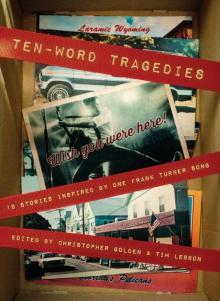 Ten-Word Tragedies
Ten-Word Tragedies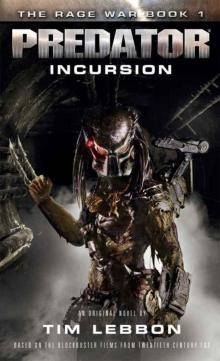 Predator: Incursion
Predator: Incursion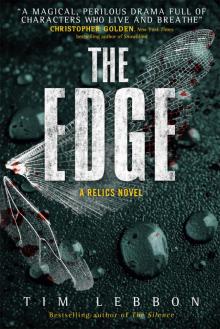 Relics--The Edge
Relics--The Edge Firefly
Firefly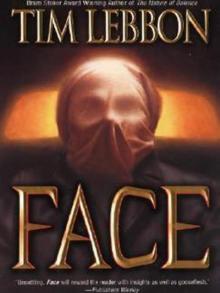 Face
Face Generations
Generations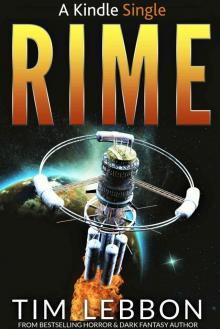 RIME (Kindle Single)
RIME (Kindle Single) Fallen
Fallen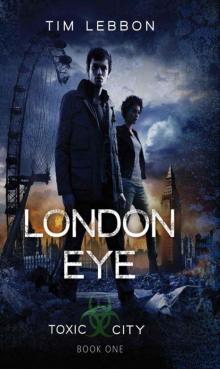 London Eye tc-1
London Eye tc-1 Kong: Skull Island
Kong: Skull Island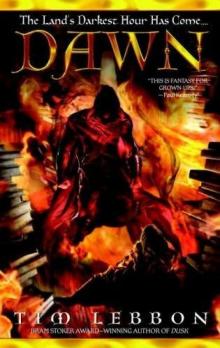 Dawn n-2
Dawn n-2 Into the Void: Star Wars (Dawn of the Jedi)
Into the Void: Star Wars (Dawn of the Jedi)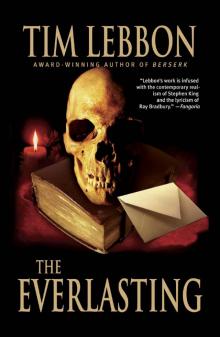 The Everlasting
The Everlasting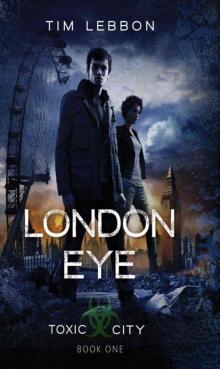 London Eye: 1 (Toxic City)
London Eye: 1 (Toxic City)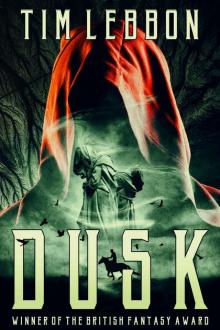 Dusk: a dark fantasy novel (A Noreela novel)
Dusk: a dark fantasy novel (A Noreela novel)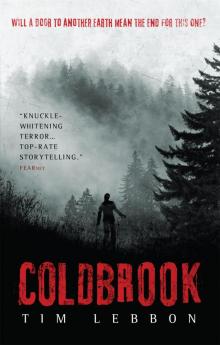 Coldbrook
Coldbrook Alien
Alien Dusk
Dusk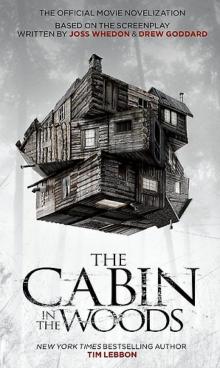 The Cabin in the Woods
The Cabin in the Woods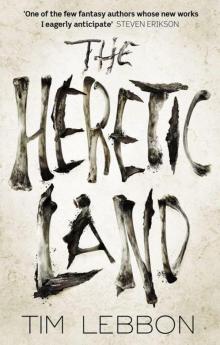 The Heretic Land
The Heretic Land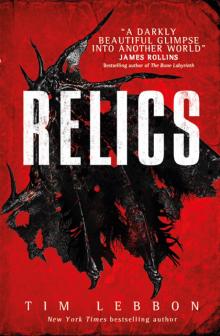 Relics
Relics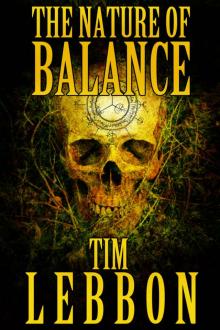 The Nature of Balance
The Nature of Balance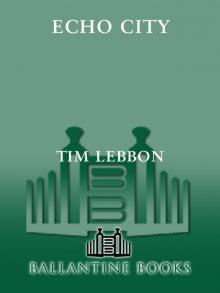 Echo City
Echo City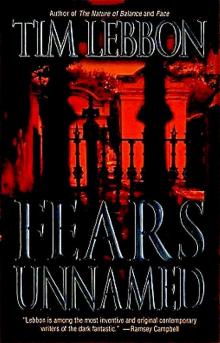 Tim Lebbon - Fears Unnamed
Tim Lebbon - Fears Unnamed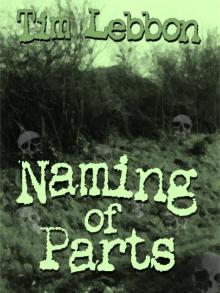 Naming of Parts
Naming of Parts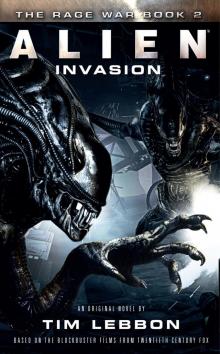 Alien--Invasion
Alien--Invasion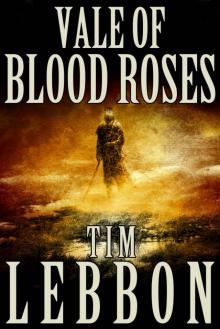 Vale of Blood Roses
Vale of Blood Roses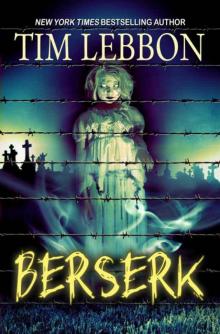 Berserk
Berserk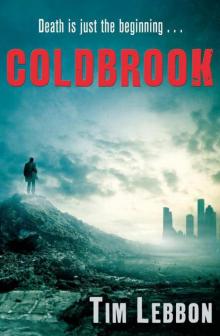 Coldbrook (Hammer)
Coldbrook (Hammer)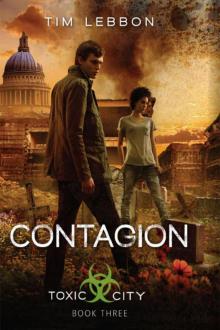 Contagion tc-3
Contagion tc-3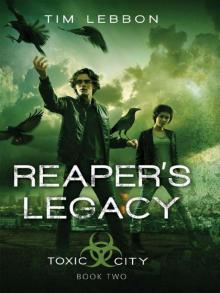 Reaper's Legacy: Book Two (Toxic City)
Reaper's Legacy: Book Two (Toxic City)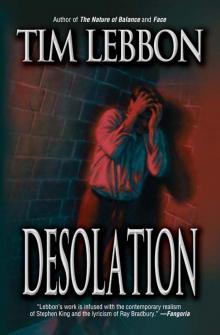 Desolation
Desolation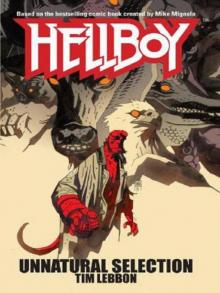 Unnatural Selection
Unnatural Selection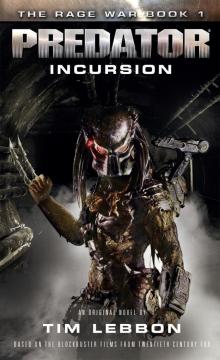 Predator - Incursion
Predator - Incursion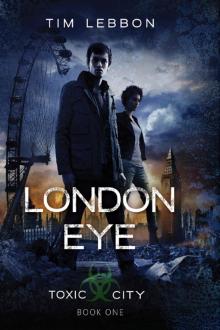 London Eye
London Eye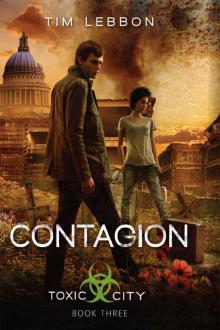 Contagion (Toxic City Book Three)
Contagion (Toxic City Book Three) The Silence
The Silence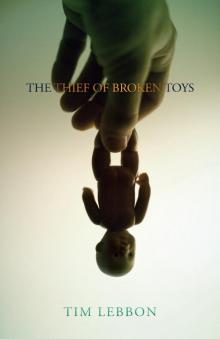 The Thief of Broken Toys
The Thief of Broken Toys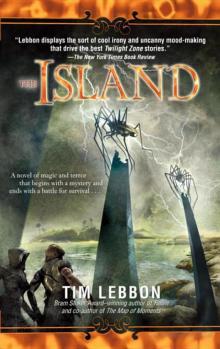 Tales of Noreela 04: The Island
Tales of Noreela 04: The Island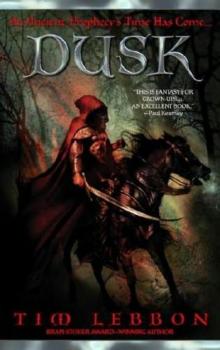 Dusk n-1
Dusk n-1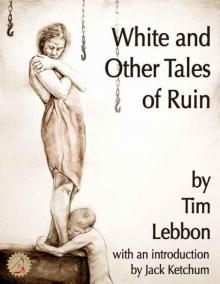 White and Other Tales of Ruin
White and Other Tales of Ruin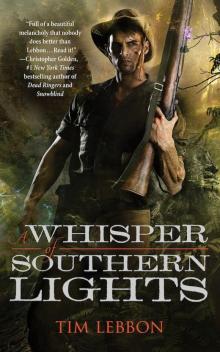 A Whisper of Southern Lights
A Whisper of Southern Lights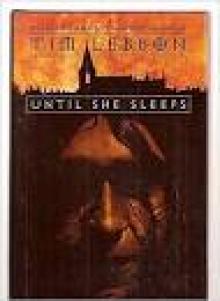 Until She Sleeps
Until She Sleeps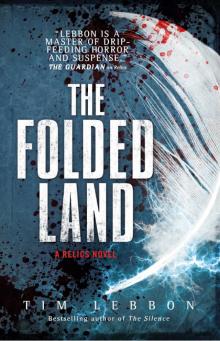 Relics--The Folded Land
Relics--The Folded Land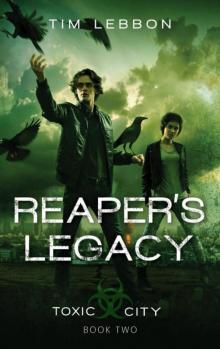 Reaper's Legacy tc-2
Reaper's Legacy tc-2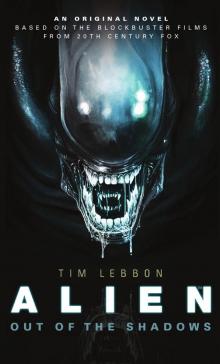 Alien: Out of the Shadows
Alien: Out of the Shadows Pieces of Hate
Pieces of Hate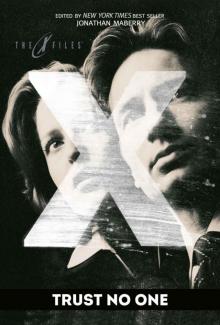 X-Files: Trust No One
X-Files: Trust No One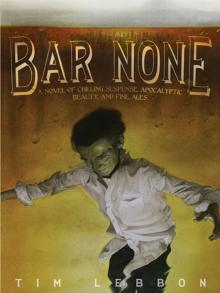 Bar None
Bar None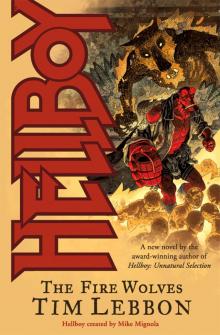 The Fire Wolves
The Fire Wolves